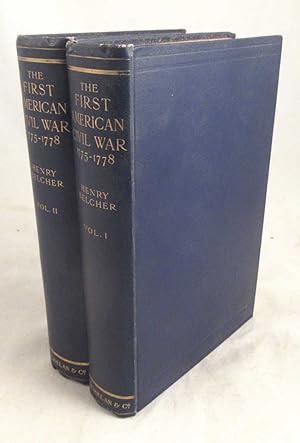“I shou’d loose my life if it was known by these people”
In the before times, not only before the pandemic but before I launched Boston 1775, I looked at the 24 Sept 1775 letter from Dr. Benjamin Church, Jr., that I’ve started analyzing.
It’s in the Thomas Gage Papers at the Clements Library in Michigan. I was there doing some of the research that eventually became The Road to Concord.
At the time I wasn’t so interested in events after the war had started, so I didn’t transcribe the letter. I merely noted that this document was in the same handwriting as other letters from Church.
That was before cell phones had cameras in them. These days, many researchers spend more time in archive reading rooms photographing than reading, taking home lots of images to decipher later.
Fortunately for me, Henry Belcher transcribed the letter and published it in The First American Civil War (1911), and that’s now available for everyone. He called the document only “An American Spy’s Report,” not recognizing Church as the spy.
Allan French’s General Gage’s Informers (1932), which confirmed Church (and Benjamin Thompson) as secret agents for Gage, didn’t discuss this letter. Neither did John Nagy’s 2013 biography of Church.
I’m sorry if I’ve missed another study, but as far as I know yesterday’s posting was the first discussion of this letter in the context of Church’s espionage career. So over several days I’m going to analyze all the parts of this letter.
Toward the end is a passage that reveals something of Church’s spycraft:
Almost all of Church’s surviving spy reports include a plea for money, like this one. That pattern strongly suggests that money motivated Church’s betrayal of the Patriot cause.
The passage above also shows the doctor clearly knew he was committing a hanging offense. Yet from the moment of his arrest to when he was sent into exile, Church denied being a spy.
TOMORROW: The ferrymen.
It’s in the Thomas Gage Papers at the Clements Library in Michigan. I was there doing some of the research that eventually became The Road to Concord.
At the time I wasn’t so interested in events after the war had started, so I didn’t transcribe the letter. I merely noted that this document was in the same handwriting as other letters from Church.
That was before cell phones had cameras in them. These days, many researchers spend more time in archive reading rooms photographing than reading, taking home lots of images to decipher later.
Fortunately for me, Henry Belcher transcribed the letter and published it in The First American Civil War (1911), and that’s now available for everyone. He called the document only “An American Spy’s Report,” not recognizing Church as the spy.
Allan French’s General Gage’s Informers (1932), which confirmed Church (and Benjamin Thompson) as secret agents for Gage, didn’t discuss this letter. Neither did John Nagy’s 2013 biography of Church.
I’m sorry if I’ve missed another study, but as far as I know yesterday’s posting was the first discussion of this letter in the context of Church’s espionage career. So over several days I’m going to analyze all the parts of this letter.
Toward the end is a passage that reveals something of Church’s spycraft:
If I am to Continue in your Service Major be so good to send me out a little Cash, Charly the ferry Man if you can trust him may give it me—Slyly—by heavens Major I shou’d loose my life if it was known by these people.The “Major” whom Church wrote to was almost certainly Maj. Edward Cane of the 43rd Regiment. He was the addressee on Church’s ciphered letter that I discussed in the last couple of days. Back in June, Cane had participated in the arrest of a couple of suspected spies within Boston.
I attempted some time ago to write you, over Chalsey ferry but the Committy would not let me go down to the ferry ways so as to see Charls. After that I did not try but went to Newport and from thence wrote. I am forced to act with the greatest Caution in this Matter, but now Sir I think a way is open by which I can let you know how matters go with us if you Requist it, If you do not, I am very much obliged to you for your kindness and friendship attested toward me & am Yrs &c. &c.
Almost all of Church’s surviving spy reports include a plea for money, like this one. That pattern strongly suggests that money motivated Church’s betrayal of the Patriot cause.
The passage above also shows the doctor clearly knew he was committing a hanging offense. Yet from the moment of his arrest to when he was sent into exile, Church denied being a spy.
TOMORROW: The ferrymen.


No comments:
Post a Comment